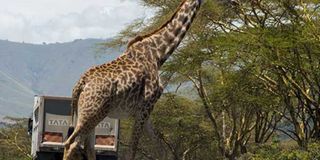Kenyans eating giraffe meat disguised as beef, conservationists say.

A giraffe. Conservationists have warned that giraffe meat is finding its way onto Kenyan plates disguised as beef. PHOTO | FILE | NATION MEDIA GROUP
What you need to know:
- The samples were bought from butcheries in Voi, Sultan Hamud and Emali towns.
- But the bigger problem is what this trends means for conservation, according to Mr Muruthi.
- CS Balala said the country needs stronger laws on those killing animals for meat.
Giraffe meat is finding its way onto Kenyan plates disguised as beef, conservationists have warned.
Results from recent DNA analysis of meat being sold in butcheries, particularly in the coastal region, have shown components of giraffe meat.
“The samples were bought from butcheries in Voi, Sultan Hamud and Emali towns. We wanted to investigate whether butcheries that sell beef are selling game meat," Mr Philip Muruthi, the African Wildlife Foundation’s vice-president for species conservation told the Saturday Nation.
"The other bush meat components we found in the butcheries were the Grant's gazelle and buffalo.”
HARD TO DISTINGUISH
Mr Muruthi said it was difficult for consumers to distinguish giraffe meat from beef as it is chopped into small chunks that are mixed with beef.
But the bigger problem is what this trends means for conservation, according to Mr Muruthi.
“This iconic species (of giraffe) is in increasing danger from poaching for meat,” he said during the launch of a five-year (2018-2022) National Recovery and Action Plan for giraffes in Kenya at Nairobi National Park.
This is the first ever national recovery and action plan for the species in Kenya.
GAME MEAT
The poaching of giraffes for game meat, their skin and body parts as well as loss of habitat due to human encroachment were identified as some of the primary reasons the animals have suffered a major reduction in population size.
Tourism minister Najib Balala wondered why the decline had continued unabated.
“When these things were going wrong … when the numbers were going down, where were we?” he asked.
“Yet all of us here at KWS are being paid.”
The CS said the country needs stronger laws on those killing animals for meat.
Kenya Wildlife Service acting Director-General Charles Musyoki said over the past 20 to 30 years, giraffes have been facing a lot of challenges across Africa yet they have received little or no attention.
He said KWS has formed a national task force for conservation of the animals.




